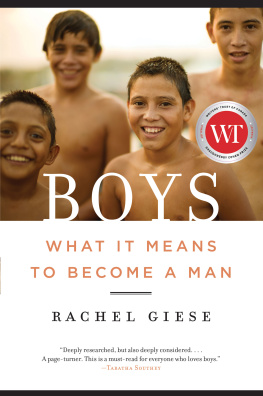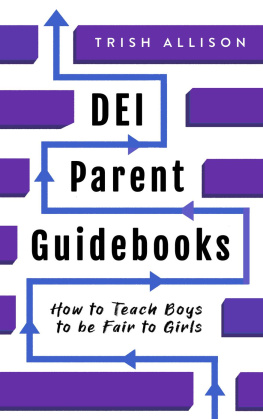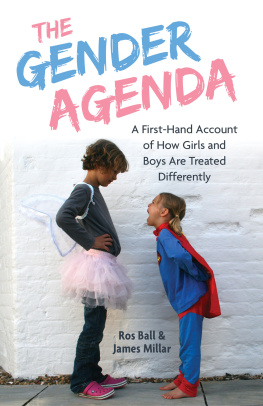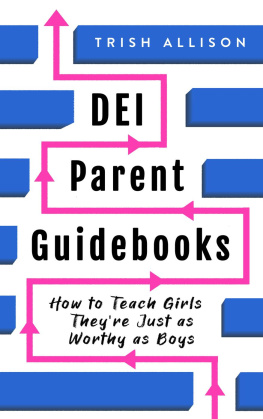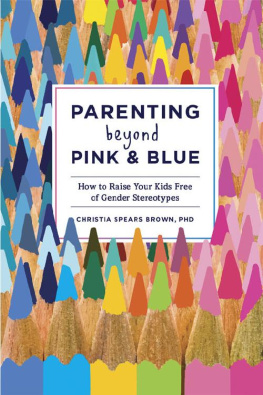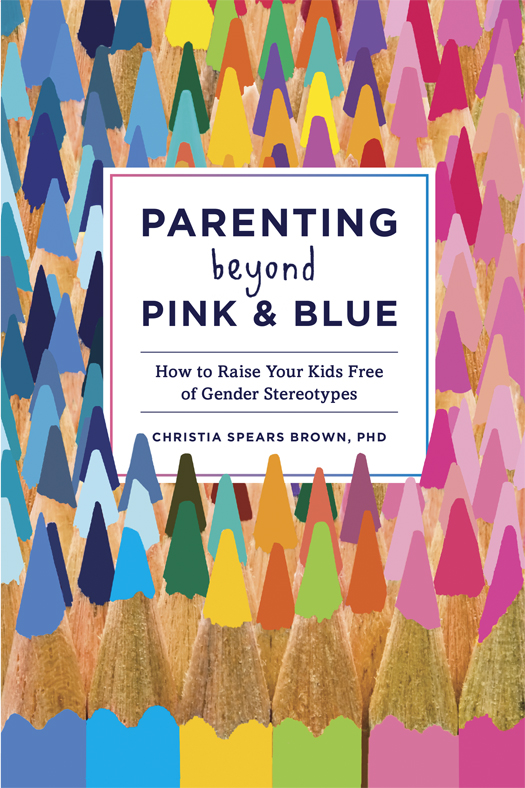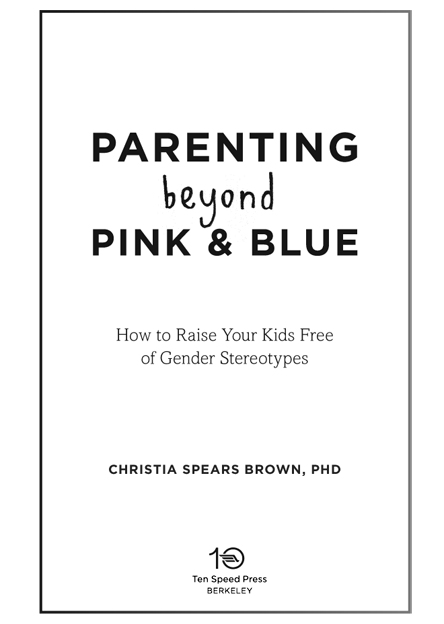Copyright 2014 by Christia Spears Brown
All rights reserved.
Published in the United States by Ten Speed Press, an imprint of the Crown Publishing Group, a division of Random House LLC, a Penguin Random House Company, New York.
www.crownpublishing.com
www.tenspeed.com
Ten Speed Press and the Ten Speed Press colophon are registered trademarks of Random House LLC
Brown, Christia Spears.
Parenting beyond pink and blue : how to raise your kids free of gender stereotypes / Christia Spears Brown, PhD. First edition.
pages cm
ISBN 978-1-60774-502-0 (pbk)
1. Parenting. 2. Stereotypes (Social psychology) 3. Sex role. 4. Sex differences (Psychology) I. Title.
HQ755.8.B763 2014
649.1dc 3
2014001259
Trade Paperback ISBN: 978-1-60774-502-0
eBook ISBN: 978-1-60774-503-7
Design by Sarah Adelman
v3.1
TO ALEX BROWN, an extraordinary man, for helping me become a developmental psychologist, a mom, and a better human
TO KRIS KEARNS, a remarkable husband and dad, for encouraging this book, putting up with my antics, and showing up every day
TO MAYA AND GRACE, two completely unique daughters, for teaching me how heartwarming and heart-wrenching parenting can be
Contents
Part I
GENDER DIFFERENCES: CHANGING OUR FOCUS
Part II
GENDER FACTS: SCIENCE AND STEREOTYPES
Part III
RAISING UNIQUE (FUN, WELL-ROUNDED, SMARTER, AND HAPPIER) KIDS
Acknowledgments
I would like to extend thanks to several people who have helped this book come to fruition. Thanks to Professors Rebecca Bigler and Campbell Leaper, two mentors and colleagues who have deeply shaped my research and thinking about gender stereotypes and the importance of parenting. Thanks to my closest friend and colleague, Professor Rashmita Mistry, for providing moral support and encouragement through this process (and patience when I bogged down our other work). Thanks to Professor Ellen Usher for reading early drafts of the manuscript and offering extremely helpful feedback. Thanks to my colleagues at the University of Kentucky (particularly in my own Psychology Department, but also colleagues in Education and Sociology) who have listened to me talk about this topic for years, both formally and informally, and encouraged me throughout. Thanks to my editor Sara Golski at Ten Speed Press for being enthusiastic about the message behind this book and helping me write the message more clearly. Thanks to my literary agent, Linda Konner, for providing mounds of helpful advice and advocacy at every stage of this process, thoughtful feedback and edits, and general guidance for this newcomer.
Closer to home, I am very grateful to the graduate and undergraduate students in the Childrens Social Identity and Inequality Research Lab, from 2003 to today. They have helped me talk about these topics in academic words and real words and helped me maintain my passion for the subject. Jordan Carr spent her evenings keeping track of all the studies I cited and turned jumbled notes into an organized reference section. A special thanks to Jennifer A. Jewell, a gender researcher herself, for running my research lab and supervising students while I dropped out of sight to write this book.
Last, enormous thanks to my husband, Kris Kearns, for listening to almost every word of this and telling me when it didnt make sense.
Prologue
On Being the Weird Daughter-in-Law
I am the weird daughter-in-law. I know it and have learned to embrace it. I first realized it when I overheard my sister-in-law whisper to my niece, Lets put that away. Aunt Christy wont like it. She was right. It was one of those light-up mirrors that girls use when they pretend to put on makeup. This pink plastic mirror came with plastic makeup and hair care productsand a voice. My skin crawled when it said, You sure look pretty with that makeup on or Wow, your hair looks great!
I quickly told my niece, who loves this makeup mirror, that I think she looks pretty all the time and that she is smart, funny, and interesting, which is even more important. Although I have no memory of it, my sister-in-law swears I took the batteries out of the mirror so that it couldnt talk anymore. I am not saying I didnt do it, and that is kind of my M.O.the subversive editing out of gender stereotypes.
I used to do this often, quietly undoing as many gender stereotypes as I could in my childrens lives. After a while, I wasnt so quiet. In my house, there is an explicit ban on pants with words written on the butt (I am not sure why someone thought it was a good idea for people to stare at the butt of a seven-year-old). My family knows about my hatred of Barbie (although she still sometimes sneaks in during Christmas). I often pull my older daughter, Maya, aside and say, Just because Grandma thinks boys are stronger than girls doesnt mean it is true.
When Maya got the latest Barbie doll for her birthday, I remembered the experiment that found that girls who were given a Barbie to play with had a more negative view of their body and weight than girls who were given a more realistic doll. When she got the latest Disney princess movie, I mentally replayed the documentary Mickey Mouse Monopoly. In it, a ten-year-old girl innocently states, in response to what she learned by watching Beauty and the Beast, that she should just be nice to her boyfriend, even when he is mean to her (statistics about teen dating violence flashed through my head). So several birthday presents get lost in the trashcan between the party and the house.
Part of my problem is that I dont want to be the weird mom or daughter-in-law, nor do I want my daughters to be the weird kids. I dont want to put No Barbies on their birthday party invitations. I know some people will give Maya Barbies, but I also know that Maya will get other toys shell enjoy too, and that shes never once missed or asked about a disappearing Barbie. All of this has me walking the fine line between stereotypes and social acceptance.
I also struggle because the biggest proponents of gender stereotypes, the biggest consumers of gender-typed toys, media, and clothes, are the caring, sweet women who love my children dearly. I have been blessed with parents and in-laws who are wonderful people. They are a challenge because they are kind people who mean no harm. One mother-in-law now just attaches the receipt with every gift in case I want to return it. So I try to edit out gender stereotypes without offending people. I can handle being thought of as weird, but I never want to be thought of as rude.
To back up a bit, I didnt start out this way. When I first got married, I didnt pay much attention to gender. I was young and childless and a recent college graduate. I was working with at-risk children in inner city schools and trying to figure out what I wanted to study in graduate school. And then my life changed on a Saturday afternoon at McDonalds.
I was in the drive-thru ordering a Happy Meal when the speaker blasted, A boy or a girl?
Huh? I said (Id been expecting a question about ketchup or napkins).
She repeated her question, clearly irritated that I wasnt going along with the script. Why does it matter? I asked. So we know what toy to put in it, she said. At that moment, I was struck by what a pointless question this was.








